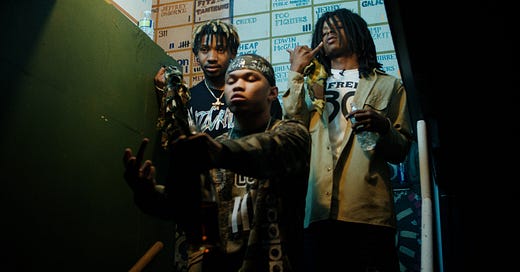Written in the Stars: 'Ghetto Children' | New Orleans Film Festival 2024
The boys of Crescent City rap artists and the troubles they confront.
Dear Moviegoers,
A city that celebrates anything and everything, all day and every day, without end has a certain “big easy” nature about it. New Orleans, of course. Parties. Dancing. Revelry.
A city of corruption, exploitation, and broken streets—figuratively and literally is too “big” and way too “easy.”
How do kids grow up in such an environment, under a cloud of good vibes and trauma?
Zac Manuel’s triptych documentary Ghetto Children may not speak of all that all the time, but should it have to when it’s on the tip of its tongue?
Manuel is known primarily as a great go-to cinematographer, with his most prominent work being his collaborations with director Garrett Bradley (Time). His feature film, originally proposed under the title blood thicker, marks a brilliant and expectedly inventive moment in his filmmaking career. Cut and shot with patience and virtue, his Ghetto Children reminds me of the phrase “every frame a painting.” Manuel, in the heat of every moment, finds the portraits that exist in our reality, from the mind, through his eyes and found in real-time. Grade A for astonishing ingenuity.
His movie follows three young rap artists: T.Y., Young Juve, and Lil Soulja Slim. They are the sons of famous rappers, all from the Cash Money Records era of the late 1990s and early 2000s. Over several years, this documentary covers the ambitions, anxieties, stumbles, and hopes of these three “ghetto children,” as life and maturity hit them like bricks.
T.Y.’s father has been in jail for many years when the movie begins. He prepares for his eventual release while trying to stay out of trouble. Lil Soulja Slim’s father died when he was a child. Now with a child himself, what kind of life does he want to have now? What is he to do? And Young Juve, probably the more stable of the three, wants to be himself. His own man. Living in the shadow of your parents, your home, and your legacy, is a burden we all bear. To see this truth flash away at twenty-four frames a second can create wisdom or damage in someone. Both? Maybe, but that’s just too much to handle.
There’s a poetic tragedy and real allegory found with these kids as they turn into men. In the film’s most significant sequence, almost halfway through, we witness:
Young Juve preparing for a performance.
T.Y. getting arrested.
Lil Soulja Slim seeing his child being born.
Just as New Orleans is an almost tale of two cities, this sequence breaks Ghetto Children into two parts, the first where the boys are near invincible and the other where gravity does its job on them. Thinking back on their fathers, there’s a generation before and the generation they are now. Thinking back to Katrina, there’s the city before the storm, and the city after. All of this is linked as the three grow up and move on, and it’s startling just how thoughtfully presented it all is.
I like to imagine these young musicians thinking back on when they were toddlers, being with their families, and living free of responsibility in their early youth. Cuts from home archive footage easily break this, shocking these men as they try and sometimes fail to find the right words to express their feelings. Their music helps, but Ghetto Children isn’t about songs or art.
It’s about a city. It’s about young black men. It’s about shadows and fog. It’s a tree of life, frankly. It’s big, but not so easy—even if filmmaker Zac Manuel makes it look easy. 4/5
Ghetto Children screened during the 2024 New Orleans Film Festival.






